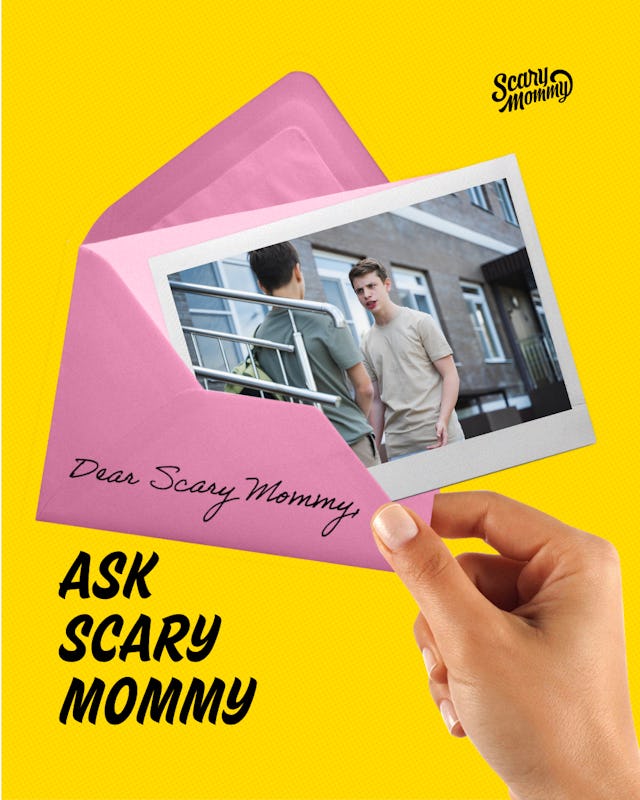What Should I Do When My Kid Uses "Autistic" As An Insult?
You need to have a talk. Here's what to say.

Ask Scary Mommy is our weekly advice column wherein Scary Mommy editors and guest editors — fellow moms like you — will answer your burning questions. You can send all of your questions and conundrums about parenting, family, and relationships to askscarymommy@bdg.com (don’t worry — we’ll keep you anonymous!).
It really sucks when you find out that it’s your kid who’s being the bully. But the truth is, it’s an issue that basically all parents will deal with at some point in their kid’s 18 years of growth. Learning how to be a good person and treat others right sadly isn’t all natural and intuitive, and the vast majority of kids need guidance from their parents as they fumble their way to being a kind and mature adult.
This week we have a really interesting question from a reader who isn’t sure how to explain certain types of insults to her kids — a situation when it’s not bad to BE something, but it is bad to CALL someone that thing. Let’s dig into it.
Dear Scary Mommy,
The other day, my kids – two boys aged 9 and 12 – were outside playing. They got into a fight, as they are wont to do, and I overheard my younger one tell his big brother, “You’re autistic!” It was meant as an insult – he isn’t autistic, but that’s beside the point. I immediately sprang into action, asking him if he would ever call someone “gay” as an insult. He immediately said no, and so, in my reaction, I equivocated the slurs, if you will, to drive home that being autistic isn’t a bad thing, and you are never to make fun of someone for their differences.
I told him we knew plenty of autistic people, and that they would likely be offended by him wielding the word as an insult. He got it, but I still think I should have had a better response ready to go. Tell me, did I handle it right? What would you have done?
— Oh Boy Mom
Dear Oh Boy Mom,
First and foremost, I think you did a great job! More specifically, you did two things right: you gave an alternative example that he could understand (“Would you call someone gay as an insult?) and you put him in the other person’s shoes to engender empathy (“How would an autistic person feel if they heard that?”). Really, I have no notes!
But I understand that you want to be able to dive a little deeper into the issue with your kids.
I think the thing that kids should understand with using words like “gay” or “autistic” as insults is that you don’t just harm the person you’re insulting, your harming an entire group of people. In other words: you’re not just bullying your younger brother, you’re also bullying a huge number of people, many of whom you don’t even know, many of whom face this kind of bullying regularly.
If your kid is on the younger side or a bit sheltered, you might be worried that if you reprimand your kid for calling someone gay or autistic, they might get the idea that being those things is bad. And that’s a good instinct. I think any sort of talking-to should absolutely include a little history lesson: “There’s absolutely nothing wrong with being autistic. However, because being autistic is often misunderstood, and because autistic people have some differences, they’ve faced a lot of ridicule... when you use autism as an insult, you’re perpetuating that.”
You could even talk about the challenges autistic people face from society, from schoolyard bullying to the recent actions of the federal administration. And then talk about why, at the end of the day, there’s simply nothing wrong with it — it’s just a cognitive difference. And it’s one that actually makes the world a better and more interesting place.
This is also a good opportunity to explain the more general concept of “othering” to your kid. When kids are in social groups, they often feel a deep need to belong. They want friends and they want to be accepted. While there are a ton of good and positive ways to be accepted, some try to achieve it through othering — creating division in order to belong. It creates an “us” and a “them,” leaving some kids out of the group (and solidifying the group of people who are othering).
Othering is something that has happened throughout history, on small and large scales, from the segregated South to the Holocaust — and it’s important that kids recognize how and why it can happen as well as why it’s so harmful.
The opposite of othering — inclusion — creates acceptance and camaraderie without excluding others. Inclusion simply can’t happen if you use labels for groups of people as insults.
— Scary Mommy
Have a situation that you’re not sure how to resolve? Write Ask Scary Mommy to get answers from real parents who’ve been there.
If it’s not obvious by the end of this article, we are not doctors or lawyers. Please don’t interpret any of the above information as legal or medical advice — go see the professionals for that!